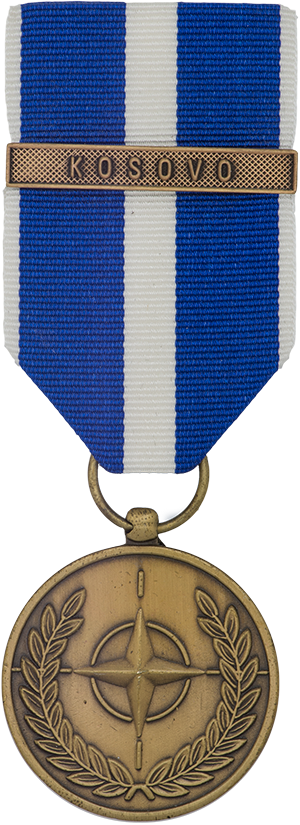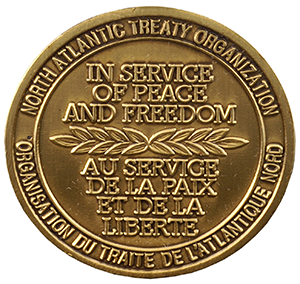NATO Medal for Kosovo (NATO-K)
The official description, eligibility, criteria, and history of the NATO Medal for Kosovo (NATO-K).


Context
The conflict in the Kosovo province of the Yugoslav Federal Republic started at the beginning of 1998 with armed incidents between the Kosovo Liberation Army (KLA) and the Yugoslav military and police force. The armed conflict caused a humanitarian catastrophe which had to be urgently addressed by a consorted action of the broad international community. From the very beginning, NATO took an active part in the peace campaign as well as contributing to Kosovo's reconstruction process after the conflict has been terminated with the help of the international community.
Eligibility and criteria
Awarded for:
- Thirty days continuous or accumulated service from 18 October 1998 to 31 December 2002 on the land, at sea, or in the air space of Kosovo and other territories of the Federal Republic of Yugoslavia, Albania, the Former Republic of Macedonia, and the Adriatic and Ionian Seas (the theatre of operations); or
- Ninety days continuous or accumulated service from 18 October 1998 to 31 December 2002 in the territories of Italy, Greece, and Hungary in direct support of the NATO operations in Kosovo (the adjacent area); or
- Aircrew who participated in Operation ALLIED FORCE between 24 March and 10 June 1999 will be deemed to have qualified after flying 15 sorties during the operation in the airspace of Kosovo and the other territories of the Federal Republic of Yugoslavia. Aircrew who completed less than 15 sorties under this criteria will be allowed to aggregate the number of sorties completed with other qualifying service.
This medal was replaced by the Non-Article 5 NATO Medal for Operations in the Balkans on 1 January 2003.
Personnel arriving in theatre before 3 December 2002 count their time towards this medal and its associated tour numerals until the end of the deployment. Personnel arriving in-theatre on or after 3 December 2002 count their time towards the Non-Article 5 NATO Medal for Operations in the Balkans. No personnel can receive the two medals for the same deployment regardless of its duration.
NATO strictly applies their medals policy and will not consider requests for initial issue of NATO medals that are submitted more than two years after repatriation from mission area.
NATO Regulations state that any person who dies or is evacuated because of injuries of medical reasons directly attributable to service is deemed to have satisfied the time criteria.
Description
The Medal is circular in form and made of bronze, and bearing:
- on the obverse, the NATO star set in a wreath of olive leaves; and
- on the reverse, the title "NORTH ATLANTIC TREATY ORGANIZATION" and the words "IN SERVICE OF PEACE AND FREEDOM" in English and French.
A 12mm bronze ring, which holds the ribbon, passes through a small hollow ball at the top of a claw joined to the top of the medal.
The ribbon is dark blue the colour of NATO with, two white stripes on either end with a solid white stripe running down the centre, representing peace.
The tour numerals are Arabic script and made of bronze.
Bar(s)
The medal is always issued with a bar, inscribed "KOSOVO".
Wearing
The medal shall be worn in sequence prescribed in the Canadian Orders, Decorations and Medals Directive, and in the following manner:
- on the left breast, suspended from the ribbon described above, after the NATO-FY medal and before the NATO-FYROM medal.
The bar is worn centered on the ribbon.
Post-nominals
The use of a post-nominal is not authorized for this medal.
Historical notes
The following is a list of members who have died while serving in the theatre of operations:
- Sgt Squires H.J.
The medal is accompanied by a certificate.